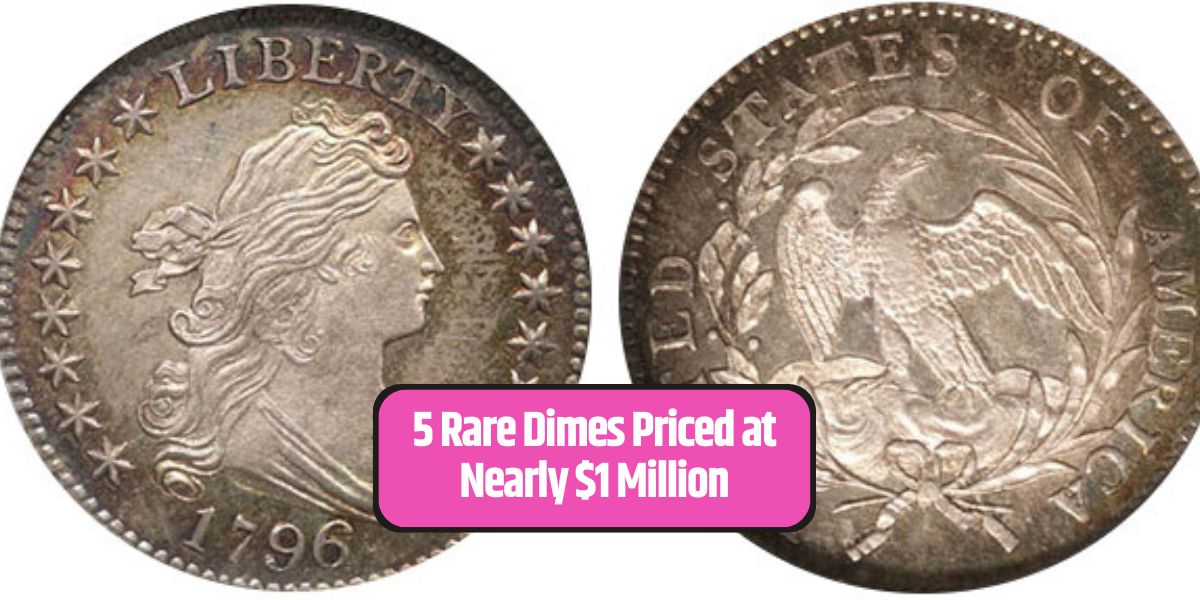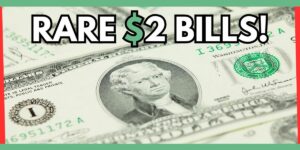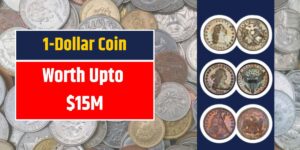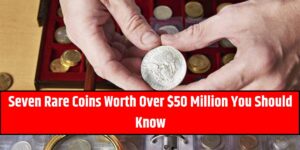Finding valuable coins in your pocket change might seem far-fetched, but certain dimes have proven to be worth small fortunes. A mix of minting errors, limited production, and unique features have transformed some dimes into treasures that collectors are eager to pay a premium for. Below, we’ll explore five of the rarest and most valuable dimes, some of which have auctioned for close to a million dollars. This serves as a reminder that inspecting your change could potentially yield surprising profits.
1. 1894-S Barber Dime
Among the most sought-after coins in the U.S., the 1894-S Barber Dime stands out for its remarkable rarity and history. Only 24 of these dimes were minted in 1894 at the San Francisco Mint, with fewer than 10 believed to still exist today. Its scarcity has made it a top prize among collectors, with auction prices nearing the million-dollar mark for high-quality specimens.
2. 1916-D Mercury Dime
The 1916-D Mercury Dime holds significant value due to its limited mintage at the Denver Mint. This coin was produced in relatively low numbers and is highly desired by collectors, especially in excellent condition. Well-preserved examples can fetch prices into the six figures, and coins in near-perfect condition are particularly prized, drawing intense competition at auctions.
3. 1975 No S Proof Dime
While relatively modern, the 1975 No S Proof Dime owes its rarity to a minting error where the “S” mintmark was omitted. Only two examples are known to exist, making it extremely rare and highly valuable. Collectors who come across one of these dimes can expect to see it valued at hundreds of thousands of dollars due to its scarcity and unique characteristics.
4. 1873-CC No Arrows Dime
Another highly valuable coin is the 1873-CC No Arrows Dime. This coin was minted in Carson City without the arrow design that was standard on other dimes from this year. Only a few of these dimes are known to exist, adding to its desirability. In the collector market, this coin commands a high price, often in the hundreds of thousands.
5. 1844 Seated Liberty Dime
Collectors often refer to the 1844 Seated Liberty Dime as the “Little Orphan Annie,” a nod to its rarity. Limited production and an intricate design have made this coin a prized addition to many collections. High-quality examples of this dime have fetched impressive prices at auction, frequently reaching six figures.
| Coin Name | Year of Mint | Estimated Value | Unique Feature |
|---|---|---|---|
| 1894-S Barber Dime | 1894 | Up to $1 million | Extremely limited mintage |
| 1916-D Mercury Dime | 1916 | $100,000+ | Limited Denver Mint production |
| 1975 No S Proof Dime | 1975 | $500,000+ | Missing “S” mintmark |
| 1873-CC No Arrows Dime | 1873 | $500,000+ | No arrows design from Carson City |
| 1844 Seated Liberty Dime | 1844 | $100,000+ | Rare production year |
Beyond these dimes, several other U.S. coins have also captured collector interest, such as the 1913 Liberty Head Nickel (worth over $3 million) and the 1955 Doubled Die Lincoln Cent (valued at over $50,000). Each of these coins reflects the fascination collectors have for rare mint errors, limited editions, and unique designs.
Why Rare Coins Are So Valuable
The factors that drive a coin’s value include rarity, condition, demand, and historical significance. Coins with minting errors or those issued in limited numbers are especially attractive to collectors. Over time, these characteristics can drive prices to astonishing levels, as even small imperfections or differences in mint marks can make a coin one-of-a-kind.
Checking Your Change for Potential Gems
For those interested in numismatics, the study of coins, finding a rare coin can be thrilling. It requires knowledge and a keen eye for detail. Carefully inspecting dimes and other coins for unusual features, like missing mintmarks or unique design elements, could yield unexpected profits. While such coins are rare, this list serves as a reminder that valuable items can sometimes be found in unexpected places.
Whether a coin is valuable due to a minting error, its limited production, or a distinct design, these rare finds highlight the potential worth of the change we handle every day. Coin collecting remains a popular hobby and can be financially rewarding for those who know what to look for.
What makes a coin valuable to collectors?
Collectors value coins based on rarity, condition, demand, and unique features like minting errors or unusual designs. Limited production or mint errors can make a coin especially desirable.
Can regular pocket change include valuable coins?
Yes, though rare. Coins with unusual features or errors sometimes enter circulation. Finding one is uncommon but can be lucrative for those who examine their change carefully.
How can I identify a valuable dime?
Look for distinct features, such as missing mintmarks, unusual design elements, or signs of minting errors. A coin appraisal from a professional numismatist can also help verify its value.




